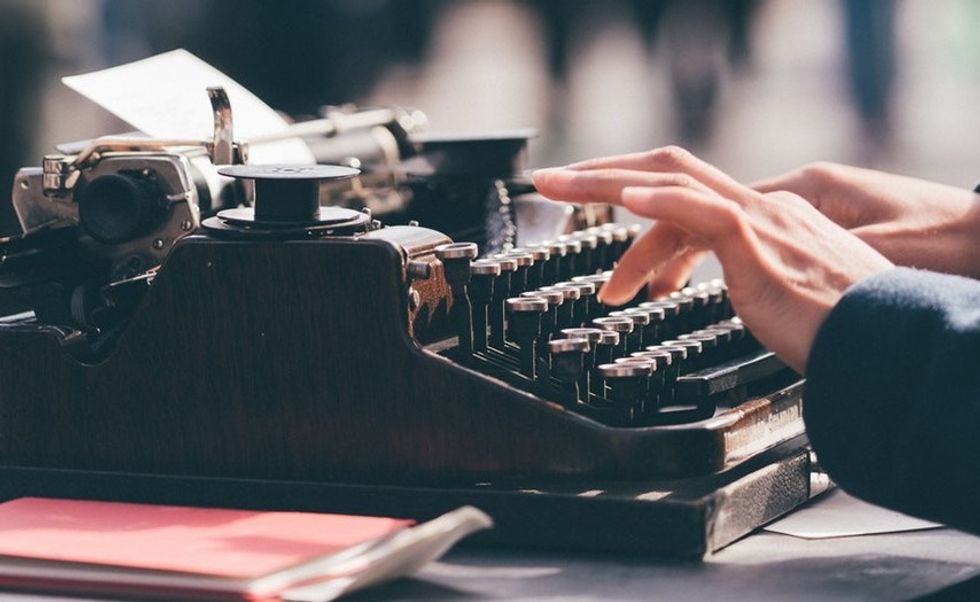While writing in general is one of my greatest passions, writing poetry in particular will always have a special place in my heart and a certain appeal that writing fiction or nonfiction just doesn't have. Composing a poem can be extremely cathartic and a great way to express yourself. But how can you make sure that you are conveying the right tone and emphasizing the right points in your poem? Well, while there is no right or wrong way to write a poem, here are a few different things you can do to spice up your pieces! These tips can help create just the right effect to properly convey the emotions you are trying to get down on the page!
1. Always add a little alliteration!

Adding a bit of alliteration into your poems always helps create a nice flow to the piece, and hearing like sounds in the beginning of words is pleasing to the ear.
2. Explore different poetic forms

I'm sure most people are familiar with poetic forms like the Shakespearean sonnet or the haiku, but there are tons of other wild and fun poetic forms out there to try your hand at! Two of my favorites are the ghazal and the golden shovel forms!
3. Assonance and consonance are your friends

Many people don't know what these are, so let me briefly explain. Kind of like alliteration, these two terms deal with the repetition of sound in words. Assonance is the repetition of a vowel sound within a word, while consonance is the repetition of a consonant sound within a word. Unlike alliteration, this repetition does not have to occur at the beginning of each word, and can occur anywhere—beginning, middle, or end—in the word. Using these tools can create an awesome flow that carries between words and can be used to connect ideas, almost like rhymes.
4. Use enjambment to emphasize important words

Enjambment is essentially just ending a line in the middle of a sentence and continuing the sentence on the next line. The first and last words in a line are the power positions, as they are the first and last ideas that a reader sees when their eyes jump from line to line. Words that are enjambed can carry a certain impact or punch to them. Keywords in your poem that are enjambed at the end of a line will be given a little more emphasis, and when followed by a word juxtaposing it, can do a great job at catching the reader off guard.
5. Play with form

By form I simply mean the way the words are arranged on the page. Who ever said that a poem needs to be in neat straight lines, with short stanzas that are all left justified? Mess around with how the words are presented. Want to convey a sense of disorder or confusion or craziness? Maybe try spreading your words out sporadically. A fun thing to do is to try and turn your poem into the shape of something discussed in it!
6. Play with punctuation

Punctuation is a small detail that can make a big difference in how a poem reads. Want the poem to read like one cohesive train of thought with no pauses in it? Try taking out all punctuation. Want to help certain phrases land well? Use several periods. It helps give an abbreviated feel and forces the reader to pause for a second. A great exercise when revising a piece is to take out all punctuation, see how it reads, and add only where you naturally pause when reading it out loud.
7. Try using a set meter and rhyme scheme

I don't like set meter and rhyme schemes myself, I'm more of a free verse kind of guy. Meter and rhyme can create more of a lyrical sound to your poem and definitely adds a certain musicality to it, though. It's fun to give it a try and see if you like it; when done correctly it can give an amazing flow to a piece and create an awesome effect!
8. Use caesuras to build tension

A caesura is simply a break or interruption between words. Using the blank space on a page between two important points is a great way to force a pause for the reader and to build up tension as to what the next few words are going to say. It is also a great way to emphasize certain powerful phrases and to help them land better!
9. Use capitalization with purpose

Capitalization, like punctuation, is also a small detail that can make a big difference. Capitalizing the beginning of every line is something that poets just starting out tend to do often. This can actually harm the flow of your poem, though. Capitalizing the beginning of the line is a means of visual separation of thoughts, meaning that if you are enjambing your sentences, you are taking unity away from the sentence itself by having a capitalized word in the middle of it, even if it is at the beginning of the line. Also consider using no capitalization at all. This is a technique that creates a really cool effect, especially when paired with no punctuation.
10. Don’t be afraid to open up and put it all on the page

I can't stress the importance of this one enough. Poetry is, at it's core, a form of self expression. Don't be afraid to be vulnerable and to put all of your feelings and emotions onto the page. Be raw, don't hold anything back. It will make a much more compelling and relatable piece in the end if you do. Don't just write your poems, bleed ink onto the page.


















